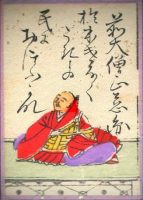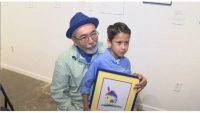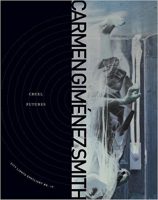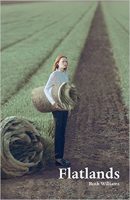May 18, 2018
Edited by David Sanders
Specimen Days
1155—Jien, Japanese poet and historian (d. 1225), is born.
1836—Virginie Loveling, Belgian writer and poet (d. 1923), is born.
1888—Giacomo Zanella, Italian poet (b. 1820), dies.
1889—Alfonso Reyes, Mexican poet/historian/diplomat (Higenia Cruel), is born.
1913—Dwijendralal Ray, Bengali poet, playwright and lyricist (Dwijendrageeti), dies of epilepsy at 49.
2009—Mario Benedetti, Uruguayan journalist, novelist, and poet, dies from respiratory and intestinal problems at 88.

Unfit, yet
The common folk of this cruel world
Would I cover,
Standing in this timber-grove
With sleeves stained black.
—Jien
“Unfit, yet / The common folk of this cruel world / Would I cover, / Standing in this timber-grove / With sleeves stained black.” – Jien
World Poetry
Poet Faiz Ahmed's Daughter Invited, Dropped from Speakers' List at Asia Media Summit

The legendary Faiz Ahmed Faiz is best remembered for his poem 'Bol ke lab azaad hain tere (Speak, for your lips are free)'. Ironically, a controversy erupted on Sunday over allegations that his daughter, Urdu poet and Pakistani national Moneeza Hashmi, was invited to Asia Media Summit in Delhi but was then "denied" permission to speak for unexplained reasons.
Poet Faiz Ahmed’s daughter has been dropped from the speakers’ list at the Asia Media Summit in Dehli.
Recent Reviews
Is Neruda Still Worth Reading Today?
by Ben Bollig
“The last thing we need is another Neruda translation”, writes Forrest Gander in the prologue to Then Come Back, a volume of recently rediscovered poems by the Chilean Nobel Laureate, now published in English for the first time. He later recants, enthusing about the new pieces, but his assertion hangs awkwardly in the air. The canonical status of Neruda is close to unquestionable: Veinte poemas de amor y una canción desesperada (1924; Twenty Love Poems and a Song of Despair) is the most commercially successful collection of verse ever produced in Spanish. But Neruda’s oeuvre is sizeable and much of it is already available in English, including several collections in multiple versions.
David Yezzi's 'Black Sea': Poems to Read, Poems for Right Now
by Frank Wilson
David Yezzi’s poetry is contemporary in a subtle way, its sophisticated rhymes and stanzas nicely seasoned with terms and references as up to date as the next moment’s tweet. There’s the mom in the supermarket parking lot who “pulls her child close and screams / something PG-13.” Then there’s the speaker in “The Consolations” who tells us how he “got to love telenovelas” and their “desperate lovers”:
I feel their hurt, its charge, in every cell—
A tongue-tip on a 9-volt Duracell.
The effect is to remind us that, however hip and “ringed by spice routes of connectivity” (“Living Room”) we may be these days, perennial themes shape and color life.
Loaded with Ore: Poets Ishion Hutchinson and Leontia Flynn Grapple with History, Heritage and Literary Tradition
by Paul Batchelor
Although very different poets, Ishion Hutchinson and Leontia Flynn have each written books that ask difficult questions about lineage – both in terms of their own families, and the poetic traditions in which they situate their work. House of Lords and Commons, Hutchinson’s second collection, opens with “Station”, and an encounter with a man who may or may not be the poet’s estranged father.
Extra Hidden Life, among the Days
by Forrest Gander
Brenda Hillman has never gone gentle into any good night. She’s been a firebrand, especially in the last two decades, flying to Washington D.C. with a Code Pink contingent to confront her representatives about militarism, driving into the desert with her husband, Robert Hass, to stand outside compounds where missiles are built, and, as she writes in a poem from her ninth and newest book, “standing at lunch hour to protest drones, racism, state killing, the death of species and so on.”
Canoodling with Junk Food: On Tommy Pico’s “Junk”
By Jacquelyn Ardam
Junk, Tommy Pico’s delicious new book-length poem, his third in as many years, opens in a multiplex. Teebs, Pico’s speaker and alter ego, doesn’t care too much about the movies; the movie theater is a place to eat junk food and make out, sometimes at the same time.
Junk, Tommy Pico’s delicious new book-length poem, his third in as many years, opens in a multiplex.
Broadsides
Notes toward an Introduction
by William Logan
Fashions in criticism rise like hemlines and fall like stocks, but the burden of criticism remains. The biographical interpretations a century ago, psychological readings a generation back, poststructuralist readings of the day before yesterday—all had their day. Many of the claustrophobia-inducing methods of the moment will soon be old hat, perhaps to be replaced by methods even worse. There’s no Whig history of criticism, at least to the cynic, only small successes in a landscape strewn with pitfalls and bear traps.
Switching Off: Joseph Brodsky and the Moral Responsibility to Be Useless
by Rachel Wiseman
In 1964, when Joseph Brodsky was 24, he was brought to trial for “social parasitism.” In the view of the state, the young poet was a freeloader. His employment history was spotty at best: he was out of work for six months after losing his first factory job, and then for another four months after returning from a geological expedition. (Being a writer didn’t count as a job, and certainly not if you’d hardly published anything.) In response to the charge, Brodsky leveled a straightforward defense: he’d been thinking about stuff, and writing. But there was a new order to build, and if you weren’t actively contributing to society you were screwing it up.
When brought to trial for “social parasitism” in 1964, Joseph Brodsky defended himself by pointing out he’d been thinking about stuff.
Drafts & Fragments
Juan Felipe Herrera Elementary Slated for 2020 in Fresno Unified

Fresno Unified School District plans to name a new elementary school after former U.S. Poet Laureate Juan Felipe Herrera — a Valley native. "As soon as it goes out for bid and a construction contract is approved – then construction will start. Right now it is planned to open in August of 2020," the district said. The school will be located in southeast Fresno on Church near Willow avenues. Herrera tweeted his thanks to his followers Wednesday saying he was "humbled and honored."
Fresno Unified School District plans to name a new elementary school after former U.S. Poet Laureate Juan Felipe Herrera.
Poetry In the News
Kayo Chingonyi Wins Dylan Thomas Prize with Poems of 'vexed celebration'
The Zambian-British writer Kayo Chingonyi’s exploration of black masculinity in his debut poetry collection Kumukanda has won him the £30,000 Dylan Thomas award.
The Swansea University International Dylan Thomas prize is awarded each year for the best literary work by an author aged 39 or under – the age the beloved Welsh poet was when he died. Chingonyi, who is 31, is the first British poet to win the genre-straddling award, which has gone in the past to Max Porter’s novel Grief Is the Thing With Feathers and Fiona McFarlane’s short-story collection The High Places.
https://www.theguardian.com/
Ondaatje Prize Goes to 'Mythic' Poems about a Mother's Mental Illness
Pascale Petit’s poetry collection Mama Amazonica, which merges the Amazon rainforest with the psychiatric ward caring for her mentally ill mother, has won the RSL Ondaatje prize for books that best “evoke the spirit of a place”.
This year’s Dylan Thomas Prize was awarded to Kayo Cingonyi.
New Books
Cruel Futures by Carmen Giménez Smith
[Paperback] City Lights,88 pp., $15.95

Cruel Futures is a witchy confessional and wildly imagistic volume that examines subjects as divergent as Alzheimers, Medusa, mumblecore, and mental illness in sharp-witted, taut poems dense with song. Chronicling life on an endangered planet, in a country on the precipice of profound change compelled by a media machine that produces our realities, the book is a high-energy analysis of popular culture, as well as an exploration of the many social roles that women occupy as mother, daughter, lover, and the resulting struggle to maintain personhood—all in a late capitalist America.
Foreign Native by Lisa Samuels
[Paperback] Black Radish Books, 152 pp., $17.00
A foreign native lives attentive to ifs. These poems are bodies walking out news, sound tracers, raw history in civic flesh, theaters of identity and talks in love. Poetry is a foreign native in our plans for language; it makes paradoxes of belonging if. The world of the poem's imagination is like Peirce's cave without walls. Our boundary disks fly out at will, expand.
Now That I Know Where I'm Going by Elinor Nauen
[Paperback] Talisman House, 142 pp., $19.95

A selection of great poems spanning decades of work by a major American writer. Describing one of her earlier books, Bill Considine wrote, "The verse is so supple, each section widens to encompass a life deeply felt and thoughtfully shared."
Solar Trauma by Philip Sorenson
[Paperback] Rescue Press, 168 pp., $16.00
"Everybody / should be throwing up all of the time," insists Philip Sorenson's incendiary and tender second collection Solar Trauma, a book that defies category in deference to the "uncontainableness of things." Sorensen writes to expose classification's errors and terminate endings: "to reject the premise that space is ever empty or divisible," to "reject purity and elsewhereness." Like the wails made by a hand trembling over the theremin, Solar Trauma's musical forms and anxieties slide and swerve.
Flatlands by Ruth Williams
[Paperback] Black Lawrence Press, 60 pp., $15.95

"Some writers approach the Nebraska plains as a big, empty other into which they may imagine. I understand the appeal of that mythology. But in Ruth Williams gorgeous new collection, Flatlands, the landscape is as alive as the plains truly are, and serves as both a generating place and quixotic companion to Williams's subtle, precise speaker. Throughout the poems, Williams images are beautifully wrought and full of surprises: a salmon being filleted opens like 'a girl's coral dress come undone,' and the 'night heat' of spent fireworks sleeps in the hands of children who are 'ready to knock.' I love this book—it's musical syncopation, the tight, clean transparency of the poems' lines. I think Willa Cather, the collection's genius loci, would admire Williams's work, recognizing its fundamental truthfulness. Which is about the highest compliment I have to give."—Erin Belieu
Cruel Futures is a witchy confessional that examines subjects as divergent as Medusa, mumblecore, and mental illness.
Correspondences
Terrance Hayes on Shakespeare, Ol’ Dirty Bastard and What Makes a Good MFA
By Jeffrey J. Williams
Terrance Hayes is one of the most celebrated poets of his generation. Currently a MacArthur Fellow, Hayes synthesizes disparate elements in his work: classical forms like the sonnet; popular culture references from hip-hop to Scooby-Doo; comments on race, especially African-American experience; modes such as the Japanese business presentation slide series pecha kucha; and reflections on fatherhood and family. As he remarks in this interview, he resists being tied to one adjective to describe himself as a poet.
Poet Hera Lindsay Bird: 'I forget about the sex in my book until I read it aloud'
By Lisa Allardice
Acclaimed by the poet laureate, Carol Ann Duffy, as “the most arresting and original new young poet”, 30-year-old Hera Lindsay Bird is one of the stars of the new generation of “Instapoets” – so called because of their use of social media – with hits including Keats Is Dead So Fuck Me from Behind and Monica, which riffs on the character from the sitcom Friends. She works in a bookshop in New Zealand. Hera Lindsay Bird is her first collection. She tours the UK this month.
Terrance Hayes synthesizes disparate elements in his work, such as Scooby-Doo and Japanese presentation slide series pecha kucha.
Envoi: Editor’s Notes
How to Write a Poem
Stumbling around the internet this morning, I tripped over this little manifesto, which I thought I would re-print here, apropos of nothing in particular. Enjoy.
"Steal a first line if you must. After you’ve finished writing the poem, destroy that line. Or not. Newspapers can be a good source of inspiration. Or not. Handwrite, preferably in turquoise ink. Or not. Worship words and keep a notebook filled with them. Or not. Memorize a poem you love. Or not. Understand that poetry is held in the body—that it works to a different kind of time and rhythm from prose words and news words and figure out how to inhabit that time. Or not. Long walks may help. Or not. Listen to Baudelaire: “Be drunk” —on wine or virtue, but be drunk. Or not. Proceed. Or not." —Tishani Doshi
(reprinted from Poetry Wales.)
How to write a poem: “Figure out how to inhabit time. Or not. Long walks may help. Or not.” – Tishani Doshi